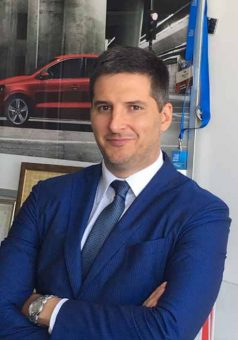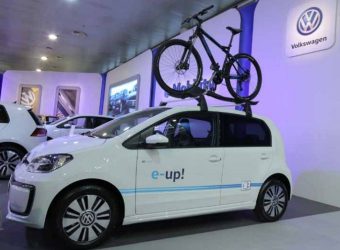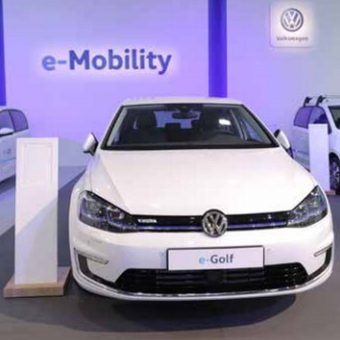
In this region, the first thing that comes to your mind when you mention Volkswagen is golf, since this car has been a favourite vehicle for decades. Times are changing, new technologies are being introduced, but Volkswagen is still in the top of the automotive industry. It comes as no surprise, when this company has launched completely new version of it. It is of course new e-Golf – at the same time comfortable and sporty, reliable and smart car which meets the latest ecological standards.
To make things even better, this car, as well as other Volkswagen’s hybrid and electric cars, can also be purchased in our country. Our interlocutor Milan Lazić, General Manager of Volkswagen in Serbia, will reveal to us the innovations that e-Golf and e-Up! and other eco cars from their fleet bring to us. He will also tell us something about the obstacles that do not allow us to see more electric cars on the streets and parking lots.
EP: Last spring, at the Car Show in Belgrade, the company Volkswagen unveiled two electric cars to the visitors. Does this mean that you believe Serbia has matured enough to accept the concept of ecology vehicles not only at the level of idea, but also in practice?
Milan Lazić: At this year’s Car Show Volkswagen has presented two electric cars – e-Golf and e-Up! As the part of European car market, Serbia is definitely involved in changes and new trends that are taking place in car industry. Of course, digitalization and electric mobility will not be implemented on our market at the same time and with the same intensity as it is already happening in highly developed European countries, but we will certainly catch up.
EP: Definitely it is not easy to be an importer of such vehicles in the countries of Western Balkans, especially in the countries that still haven’t joined the European Union and have not harmonized regulations on traffic. What would be the main problems you face in Serbia?
Milan Lazić: The first obstacle is certainly the origin of certain components of electric vehicles, such as batteries, heat pumps, etc. that are often manufactured outside the EU so when importing we pay extremely high customs costs. The incentives of any kind are lacking, and charging infrastructure is definitely a problem. However, it is interesting that the process of registration and insurance is quite simple and it is done on the basis of declared power of aggregate, and it is the same with the obligatory insurance.

EP: How interested are customers in buying your hybrid and electric cars in our country? Are there any serious buyers?
Milan Lazić: The sale of Volkswagen’s electric cars has already begun on out market. In 2016 the first cars were delivered. In particular, one international bank has purchased a fleet of 7 e-Up! cars. After almost a year of driving these cars on our roads, the client has only words of praise and they are satisfied with the purchase of their electric fleet. They have participated with us several times in the presentations of electric cars to the media, as well as to our dealers and clients, emphasizing the benefits of driving these cars in comparison to the traditional aggregate.
Ecologically responsible companies as well as individuals are showing greater interest in our new product. Of course, at this moment, everything is still at the level of inquiries about technical characteristics of electric cars, experience from other markets, our forecasts on the development of charging infrastructure and about price policy.
EP: How many of them give up from buying electric cars due to aforementioned obstacles and decide to buy a car on petrol of diesel?
Milan Lazić: The fact is that almost 100 per cent of our clients still decide to buy a car with petrol or diesel aggregates. However, the times are slowly changing.
EP: What are your predictions for launching of the market in Serbia?
Milan Lazić: Whether the sales of e-cars will develop at a faster or slower rate depends on a variety factors: state’s
subsidies for the purchase of electric cars, development of charging infrastructure, benefits for drivers (such as reserved parking lots with chargers in public garages, the possibility of driving on bus lanes…) and other advantages that exist in other countries.
EP: Can you give us some positive examples that are proved to be successful in developed countries – what are the incentives that importers have, and what incentives do the buyers of “green” Volkswagen’s cars have?
Milan Lazić: Developed e-markets do not have any fees for the import of electric cars. On the contrary, the incentives are mostly financial and they range, depending on the model, from 5,000 to 10,000 euros. In addition, charging (recharging) at public stations is free and the cost of annual registration is less than one euro. Electric vehicles are allowed to enter the immediate city zones, the parking is free and a special benefit is allowed driving on bus lanes.
EP: As the search for public chargers here is still like looking for a needle in a haystack, can you tell us how you meet the needs of potential clients and also tourists or business people who want charge their for example e-Up! on their way through our country? Where can they do that? What are your plans for the development of charging infrastructure?
Milan Lazić: Construction of infrastructure that is setting up the network of chargers is the project which we are intensively working on. The first AC charger was installed a few months ago in front of Porsche Belgrade North’s sales and service centre on Zrenjaninski road. Currently, the strongest available charger of 50 kW will be placed at the same location in the following few weeks. Also, we have a plan for installing a charger in front of sales and service centre of Porsche Novi Sad. Also, there are chargers in IKEA department store, Obilićev venac garage and in a few hotels and shopping malls. There are applications that provide precise information on charger location and charger type as well as other useful notes. These apps definitely make it easier for users to plan charging of their electric vehicles.
EP: Why would one opt for e-Golf? Tell us how many kilometres can you travel with a single charge, that is, what is the battery’s capacity?

Milan Lazić: The new e-Golf has several different available driving profiles so that you can choose a comfortable or sporty type. The maximum range is 300km with a single battery charge in ECO mode.
EP: What are the advantages of e-Up!?
Milan Lazić: The range that e-Up! can reach with a single charge is up to 160 km and that is what makes this car ideal for every day usage. In addition to efficiency, e-Up! is characterized by the latest technological innovations that represent standard in far higher segments. Also, its agility and dimensions make it a perfect city car.
EP: Of course e-Up! and e-golf are not the only electric cars that Volkswagen offers. Tell us something about them and also about the concepts that are still under development.
Milan Lazić: Currently, Volkswagen’s feet has two models of electric cars in its offer, e-Up! and e-Golf. An abundance of electric cars are expected from 2020, and we would single out I.D. concept – SUV model I.D. Cross.
EP: What does Volkswagen offer from freight and passenger programs? Do you work on the introduction of ecomobility on this plan?
Milan Lazić: All brands within Volkswagen Group, including MAN and Scania, are intensively working on the production of models with the electric drive.
EP: Many manufacturers of electric cars have a problem with the battery production technology, can you tell us something about capacities of your batteries? What innovations does Volkswagen plan to introduce in this area?
Milan Lazić: Volkswagen plans to start the production of batteries in two factories that are located in European Union in the next five years.
EP: Given the fact that Tesla car is still beyond reach in many countries, simply because it is too expensive, the experts in electromobility believe that Volkswagen Group is the only one that can draw parallel to Elon Musk with its energy efficient and affordable cars. Can you tell us something about your strategy for the future?
Milan Lazić: I would mention here MEB platform and I.D. gamma vehicles whose characteristics are such that competition will have to make efforts in order to respond adequately.
Interview by: Vera Rakić
The interview was originally published in the eighth issue of the Energy Portal Bulletin, named EKO-MOBILITY.



